Best laptops for computer engineering students
For computer engineering students, a reliable and powerful laptop is an essential tool for success. From coding complex algorithms to running sophisticated software simulations, your laptop needs to handle demanding workloads while remaining portable and comfortable for long hours of study. Choosing the right laptop can be overwhelming, with a vast array of options on the market. But fear not, fellow code warriors! This guide will help you navigate the tech landscape and identify the best laptop for your needs and budget.
Computer Engineering Laptop Requirements
- Processor: Intel Core i5 (10th Gen or newer) or AMD Ryzen 5 (4th Gen or newer)
- Memory (RAM): 16 GB
- Storage: 500 GB SSD
- Graphics: Integrated graphics (Intel Iris Xe or AMD Radeon), Dedicated graphics card (for 3D modeling/simulation)
- Operating System: Windows 11, macOS Monterey, or Linux
- Display: 15.6-inch Quad HD (2560×1440) or higher resolution
Best Laptops for Computer Engineering Students
- Apple 2023 MacBook Air Laptop with M2 chip ($2,098)
- ASUS TUF Gaming A15 (2023) Gaming Laptop ($1,385)
- HP Envy 16″ 120Hz WQXGA IPS Touchscreen Laptop ($1,899)
- Dell 2024 XPS 17 9730 17” WQUXGA IPS Touch Laptop ($3,499)
- LG 2024 Gram 15Z90RT-K 15.6” FHD Laptop ($1,359)
- Acer Aspire 7 Laptop ($829)
- MSI Raider GE76 Gaming Laptop ($1,389)
1. Apple 2023 MacBook Air Laptop with M2 chip
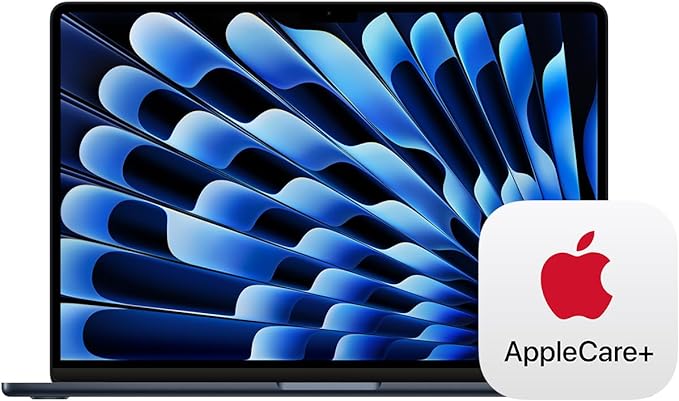
| Brand | Apple |
| Memory | 16GB RAM |
| Display resolution | 2560 x 1600 pixels |
| Storage | 1TB SSD |
The MacBook Air with its impressive 15-inch Liquid Retina display and powerful M2 chip presents a strong option for computer engineering students. Let’s break down its features in the context of student needs:
Properties of MacBook Air
- Powerful Performance: The M2 chip with 8-core CPU, 10-core GPU, and up to 24GB of unified memory can handle demanding engineering software, simulations, and development tools.
- Spacious & Beautiful Display: The 15.3-inch Liquid Retina display with 500 nits of brightness and wide color gamut ensures stunning visuals for coding, design work, and presentations.
- Excellent Battery Life: Up to 18 hours of battery life ensures uninterrupted work on the go, allowing you to power through lectures, labs, and projects without worrying about charging.
- Lightweight & Portable: Despite the large screen, the MacBook Air remains surprisingly thin and light, making it easy to carry around campus or between classes.
- Long-lasting Durability: The 100% recycled aluminum enclosure offers robust protection for your investment.
- AppleCare+: Provides extended warranty and accidental damage coverage for peace of mind.
For students who prioritize a premium experience with a large, beautiful display, long battery life, and excellent performance, the MacBook Air with the M2 chip is an impressive choice. It offers more than enough power for most computer engineering tasks and provides a portable, reliable platform for learning and working.
2. ASUS TUF Gaming A15 (2023) Gaming Laptop
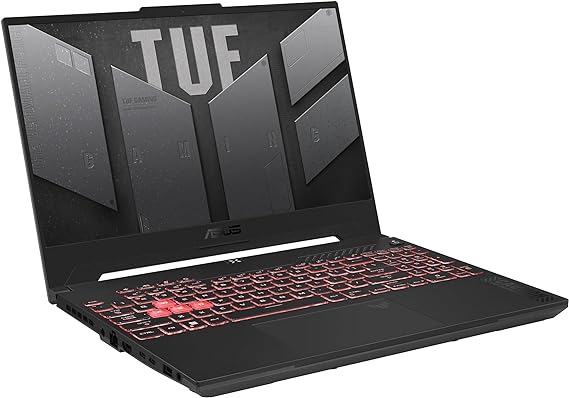
| Model Name | FA507XI-EH94 |
| Screen Size | 15.6 Inches |
| Color | Mecha Gray |
| Hard Disk Size | 1 TB |
| CPU Model | Ryzen 9 |
| Ram Memory Installed Size | 16 GB |
| Operating System | Windows 11 Home |
| Graphics Card Description | Dedicated |
| Graphics Coprocessor | NVIDIA GeForce RTX 4070 |
The ASUS TUF Gaming A15 seems to be a powerful and well-equipped laptop that could be suitable for computer engineering students, but there are some aspects to consider.
Properties of ASUS TUF
- Processing Power: The AMD Ryzen 7 7940HS CPU is a strong processor that can handle demanding tasks commonly encountered in computer engineering, such as coding, simulations, and virtualization.
- Graphics Performance: The NVIDIA GeForce RTX 4070 Laptop GPU with a 140W Max TGP is a robust graphics card that can handle GPU-intensive tasks, including certain types of simulations and graphic design work.
- Memory and Storage: The 16GB of DDR5-4800MHz memory and 1TB PCIe 4×4 storage provide ample space for multitasking and quick access to data, which is crucial for computer engineering work.
- Display Quality: The FHD 144Hz display with 100% sRGB color coverage is a positive feature for tasks that require accurate color representation, such as graphic design or video editing.
- Cooling System: The pair of 84-blade Arc Flow Fans and the mention of improved cooling performance are important for maintaining optimal performance during extended periods of heavy use, which can be common in computer engineering tasks.
- MUX Switch with Advanced Optimus: The inclusion of a MUX Switch for routing frames directly from the dGPU to the display can enhance gaming performance, but its utility in computer engineering tasks may vary. However, Advanced Optimus is a plus for automatic switching between iGPU and dGPU based on the task, optimizing battery life.
- Durability: The laptop’s adherence to military-grade toughness standards (MIL-STD-810H) is a positive factor for students who may need to carry their laptops to various places and face different environmental conditions.
- Xbox Game Pass Ultimate: While the Xbox Game Pass Ultimate is a nice addition, it may not be the most crucial feature for computer engineering students, unless they are also avid gamers.
In conclusion, the ASUS TUF Gaming A15 appears to be a strong contender for computer engineering students, offering a balance of processing power, graphics capabilities, memory, storage, and durability. However, individual preferences and specific software requirements should be considered before making a final decision.
3. HP Envy 16″ 120Hz WQXGA IPS Touchscreen Laptop
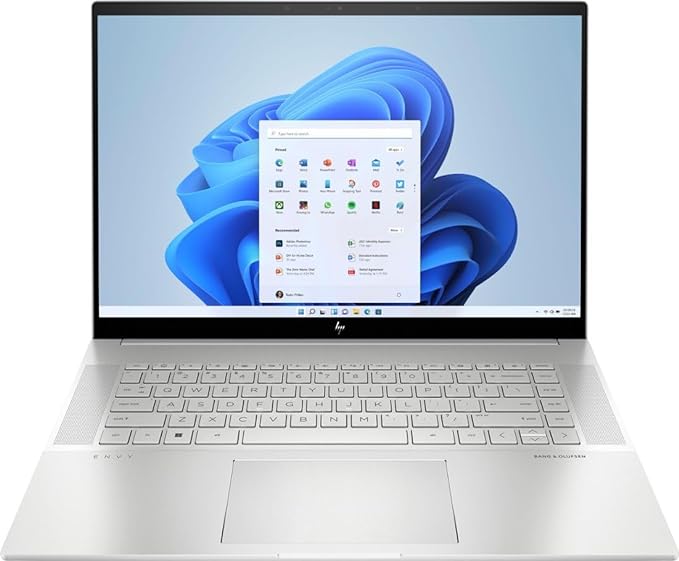
| Model Name | Envy 16-H100 |
| Screen Size | 16 Inches |
| Color | Natural Silver |
| Hard Disk Size | 1 TB |
| CPU Model | Intel Core i9 |
| Ram Memory Installed Size | 32 GB |
| Operating System | Windows 11 Pro |
| Special Feature | HD Audio, Backlit Keyboard, Memory Card Slot |
| Graphics Card Description | NVIDIA GeForce RTX 4060 Dedicated |
The HP Envy 16 is a powerful and well-equipped laptop that is truly suitable for computer engineering students. Here are some reasons why it could be considered one of the best laptops for such students:
Properties of Envy 16
- High-Performance Processor: The 13th Gen Intel Core i9-13900H with 14 cores and a maximum clock speed of 5.4 GHz provides substantial processing power. This is beneficial for running resource-intensive applications and handling complex computations, which are often part of computer engineering tasks.
- Ample Memory and Storage: With 32GB DDR5 SDRAM operating at 4800 MHz and a 1TB PCI-E NVMe Solid State Drive, the laptop offers quick data access and smooth multitasking, which is crucial for software development, simulations, and other engineering-related activities.
- Impressive Display and Graphics: The 16-inch 120Hz WQXGA IPS touchscreen with NVIDIA GeForce RTX 4060 graphics ensures a vibrant and detailed visual experience. This is beneficial for tasks such as 3D modeling, graphic design, and simulations that computer engineering students may encounter.
- Connectivity Options: The inclusion of Thunderbolt 4, USB4, HDMI 2.1, and other ports ensures compatibility with various peripherals and external displays. This flexibility can be valuable in a computer engineering environment where different devices and accessories may be needed.
- Portable Design: While not the lightest, the laptop’s dimensions and weight seem reasonable for a device with such high-end specifications. The 83Whr battery provides a decent amount of power for on-the-go use.
- Enhanced Features: The backlit keyboard, Wi-Fi 6E support, Bluetooth 5.3, and a high-quality True Vision camera with a privacy shutter add to the overall user experience and align with the needs of computer engineering students.
- Included Accessories: The addition of a 32GB USB drive can be convenient for storing additional data or creating backups.
In summary, the HP Envy 16 seems to offer a balanced combination of performance, features, and portability, making it a strong contender for computer engineering students who require a laptop capable of handling demanding tasks.
4. Dell 2024 XPS 17 9730 17” WQUXGA IPS Touch Laptop
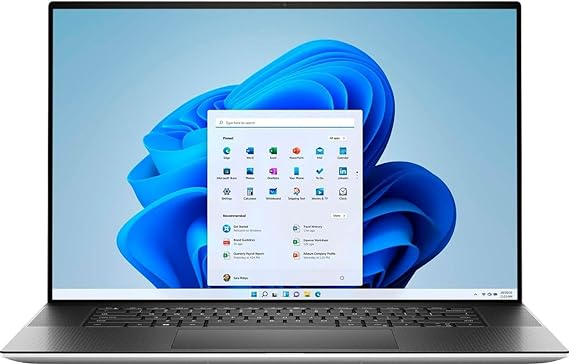
| Model Name | XPS 17 9730 |
| Screen Size | 17 Inches |
| Color | Platinum Silver |
| Hard Disk Size | 1 TB |
| CPU Model | Core i7 Family |
| Ram Memory Installed Size | 32 GB |
| Operating System | Windows 11 Pro |
| Graphics Card Description | NVIDIA GeForce RTX 4070 8GB Dedicated |
The Dell XPS 17, as described, is an excellent choice for computer engineering students for several reasons:
Properties of XPS 17 9730
- Powerful Performance: The laptop boasts a 13th Generation Intel Core i7-13700H processor with 14 cores and 20 threads. This configuration ensures high computational power, which is essential for running demanding software and simulations typically used in computer engineering tasks.
- Ample Memory and Storage: With 32GB DDR5 SDRAM and a 1TB PCI-E NVMe Solid State Drive, the laptop offers ample memory and storage capacity. This allows students to multitask seamlessly and store large datasets, code repositories, and project files without facing performance bottlenecks.
- High-Resolution Display: The 17″ Touchscreen LED-backlit WQUXGA display with a resolution of 3840 x 2400 and 500 nits brightness offers a crisp and clear viewing experience. The high resolution is beneficial for tasks such as coding, graphic design, and CAD work, where detail and clarity are essential.
- Dedicated Graphics Card: The NVIDIA GeForce RTX 4070 8GB GDDR6 graphics card ensures smooth rendering of graphics-intensive applications and enables students to work on projects involving 3D modeling, game development, and machine learning.
- Connectivity Options: The laptop features advanced connectivity options, including Intel Killer Wi-Fi 6E AX211 and Bluetooth 5.3, along with multiple USB-C Thunderbolt 4 ports and an HDMI port. This allows students to connect to high-speed networks, external displays, peripherals, and storage devices with ease.
- Portability and Battery Life: Despite its powerful hardware, the Dell XPS 17 remains relatively portable, weighing 5.37 lbs and featuring a slim design. The 97Whr 6-cell lithium-ion battery offers long-lasting battery life, allowing students to work on their projects without constantly worrying about recharging.
- Windows 11 Pro and Additional Features: The inclusion of Windows 11 Pro provides students with access to advanced productivity features and enhanced security. Furthermore, features such as a backlit keyboard, fingerprint reader, and studio-quality audio speakers enhance the overall user experience and productivity.
In summary, the Dell XPS 17 offers a combination of powerful performance, high-quality display, versatile connectivity, and portability, making it an ideal choice for computer engineering students who require a reliable and capable laptop for their coursework, projects, and research.
5. LG 2024 Gram 15Z90RT-K 15.6” FHD Laptop
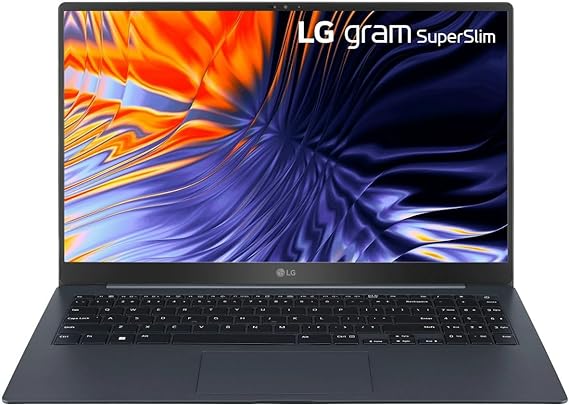
| Model Name | Gram 15Z90RT-K |
| Screen Size | 15.6 Inches |
| Color | Neptune Blue |
| Hard Disk Size | 1 TB |
| CPU Model | Core i7 Family |
| Ram Memory Installed Size | 16 GB |
| Operating System | Windows 11 Pro |
| Graphics Card Description | Integrated |
The LG Gram 15, as described, offers a compelling set of features that make it an excellent choice for computer engineering students:
Properties of LG Gram
- Powerful Performance: The laptop boasts a 13th Generation Intel Core i7-1360P processor with 12 cores and 16 threads, providing immense processing power ideal for running demanding engineering software, coding environments, and simulations.
- Customization and Upgradeability: The seal being opened for hardware and software upgrades allows students to adapt the laptop to their evolving needs, ensuring it remains relevant throughout their academic and potentially professional careers.
- High-Speed Memory and Storage: With 16GB DDR5 SDRAM clocked at 6000 MHz and a 1TB PCI-E NVMe Solid State Drive, the laptop offers swift multitasking capabilities and ample storage for large engineering projects, datasets, and applications.
- Vibrant Display and Graphics: The 15.6″ OLED FHD display with 400 nits brightness and DCI-P3 100% coverage provides crisp visuals and accurate color representation, crucial for tasks like CAD design, image processing, and multimedia editing.
- Connectivity: The inclusion of Intel Wi-Fi 6E AX211 and Bluetooth 5.1 ensures fast and reliable wireless connectivity, while the Thunderbolt 4/USB4 ports offer high-speed data transfer and versatile connectivity options for external displays and peripherals.
- Enhanced Multimedia Experience: The laptop features HD audio with Dolby Atmos and stereo speakers, creating an immersive audio experience for multimedia projects and entertainment.
- Portability and Battery Life: Weighing just 2.18 lbs and with a slim profile of 0.49 inches, the LG Gram 15 is highly portable, making it convenient for students to carry between classes, labs, and study sessions. The 60Whr battery provides decent battery life for all-day productivity.
- Windows 11 Pro and Additional Accessories: The inclusion of Windows 11 Pro enhances productivity with its advanced features and security, while the free 32GB USB drive offers additional storage and backup options.
Overall, the LG Gram 15 excels in offering a powerful, portable, and versatile computing solution tailored to the demanding requirements of computer engineering students, making it a top contender for the best laptops in its class.
6. Acer Aspire 7 Laptop
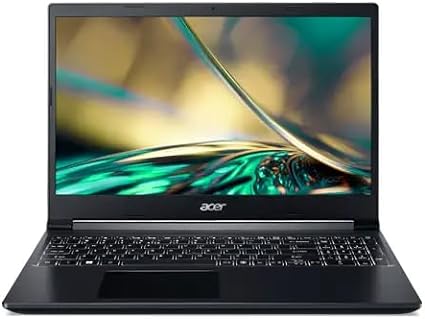
| Model Name | Aspire 7 |
| Screen Size | 15.6 Inches |
| Color | Charcoal Black |
| Hard Disk Size | 1 TB |
| CPU Model | Ryzen 5 |
| Ram Memory Installed Size | 16 GB |
| Operating System | Windows 11 Pro |
| Special Feature | HD Audio, Backlit Keyboard, Anti Glare Coating, Numeric Keypad |
| Graphics Card Description | NVIDIA GeForce RTX 3050 Dedicated |
The Acer Aspire 7 outlined here boasts a combination of features that make it a compelling choice for computer engineering students:
Properties of Aspire 7
- Powerful Processor: The AMD Ryzen 5 5625U 6-Core Processor with up to 4.3 GHz clock speed and 12 threads provides ample processing power for various computing tasks, including high-definition video editing, programming, and design work.
- Ample Memory and Storage: With 16GB of DDR4 RAM operating at 3200MHz and a 1TB PCIe NVMe SSD, this laptop ensures smooth multitasking, fast data access, and sufficient storage space for large engineering projects and software development.
- Dedicated Graphics: The NVIDIA GeForce RTX 3050 4GB GDDR6 graphics card enhances the laptop’s capabilities for tasks such as CAD modeling, simulation, and gaming, which can be relevant and engaging for computer engineering students.
- High-Definition Display: The 15.6″ LED-backlit IPS display with a resolution of 1920 x 1080 provides crisp visuals, which are crucial for tasks like analyzing code, reviewing diagrams, and viewing project documentation with clarity.
- Connectivity Options: The inclusion of Realtek Wi-Fi 6, Bluetooth 5.1, and various USB ports ensures seamless connectivity to networks, peripherals, and external devices, facilitating collaboration and project work.
- Portability and Battery Life: With dimensions of 14.3 x 10.0 x 0.90 inches and a weight of 4.74 lbs, coupled with a 50 Whr battery, this laptop strikes a balance between portability and battery life, enabling students to work comfortably both on-campus and off.
- Operating System and Additional Features: Windows 11 Pro provides a familiar and secure computing environment, while features like a full-size backlit keyboard with a numpad, integrated HD camera and microphone, and dual 2W speakers enhance usability and productivity.
Overall, the Acer Aspire 7 offers a well-rounded package of performance, portability, and features tailored to the demanding requirements of computer engineering students, making it a top contender in the category of best laptops for this field of study.
7. MSI Raider GE76 Gaming Laptop
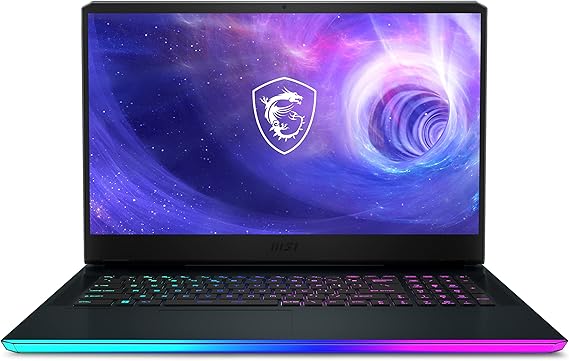
| Model Name | Raider GE76 12UE-871 |
| Screen Size | 17.3 Inches |
| Color | Black |
| Hard Disk Size | 1 TB |
| CPU Model | Core i9 |
| Ram Memory Installed Size | 16 GB |
| Operating System | Windows 11 Home |
| Special Feature | Numeric Keypad |
| Graphics Card Description | GeForce RTX 3060 Dedicated |
The MSI Raider GE76 Gaming Laptop is an excellent choice for computer engineering students for several reasons:
Properties of Raider GE76
- Powerful Processor: With the Intel Core i9-12900H, this laptop provides high-performance computing power, essential for running complex simulations, coding environments, and resource-intensive software. This processor ensures smooth multitasking and efficient execution of engineering applications.
- High-End Graphics Card: The GeForce RTX 3060 GPU enhances the laptop’s ability to handle graphically demanding tasks such as 3D modeling, simulations, and gaming. For computer engineering students working on graphical programming or machine learning projects, this GPU provides the necessary power and support.
- Large and High-Quality Display: The 17.3″ 144Hz FHD display offers ample screen real estate and high refresh rates, which are beneficial for coding, debugging, and running multiple applications simultaneously. The large screen helps in reducing eye strain during long study sessions and improves productivity.
- Ample RAM and Storage: With 16GB of DDR5 RAM and a 1TB NVMe SSD, this laptop provides sufficient memory and fast storage for handling large datasets, running virtual machines, and storing project files. The high-speed SSD ensures quick boot times and fast file access, which is crucial for a smooth workflow.
- Thunderbolt 4 Connectivity: Thunderbolt 4 offers fast data transfer speeds and supports a range of peripherals and external devices. This is useful for connecting to high-speed storage drives, external displays, and other hardware that might be needed for various projects.
- Cooling Technology: The Cooler Boost 5 system helps maintain optimal temperatures during intense workloads, preventing thermal throttling and ensuring that the laptop performs at its best, even during prolonged use.
- Modern Operating System: Windows 11 Home provides the latest features and security updates, ensuring compatibility with the latest software and tools used in computer engineering.
Overall, the MSI Raider GE76’s combination of high-performance components, ample storage, advanced connectivity options, and cooling technology makes it a powerful and reliable choice for computer engineering students who need a laptop that can handle demanding tasks and provide a seamless computing experience.
Conclusion
Ultimately, the best laptop for a computer engineering student depends on individual needs and priorities. Consider your budget, preferred operating system, portability requirements, and intended workload. While the laptops listed here excel in specific areas, countless other options exist. Conduct thorough research, compare specifications, and prioritize features that align with your academic journey. Remember, your laptop is an investment, so choose wisely to ensure it supports your learning and future endeavors in computer engineering.
Engineering laptops – Best laptops
FAQs
Choosing the right laptop as a computer engineering student can feel like navigating a complex circuit board. You need the perfect balance of power, portability, and features to handle demanding software, intensive tasks, and maybe even some gaming on the side. Don’t worry, though! We’ve compiled a comprehensive FAQ guide to help you decode the specs and find the perfect laptop that fits your needs and budget. Dive in and get ready to power up your academic journey!
In this section, we will look for answers to the following frequently asked questions about laptops for computer engineers.
- Which laptop is best for computer engineering?
- Do I need a powerful laptop for computer engineering?
- Is MacBook good for computer engineering students?
1. Which laptop is best for computer engineering?
The best laptop for computer engineering depends on your specific needs and budget. However, there are a few general features that you’ll want to consider:
- Processor: A powerful processor is essential for running demanding engineering software. Look for an Intel Core i7 or AMD Ryzen 7 processor, or even better, an i9 or Ryzen 9 if you can afford it.
- RAM: 16GB of RAM is a good starting point, but 32GB is even better if you plan on running multiple programs simultaneously.
- Storage: A 512GB SSD is the minimum amount of storage you’ll need, but 1TB is even better.
- Graphics card: A dedicated graphics card is helpful for running 3D modeling and other graphics-intensive applications, but it’s not essential for everyone.
- Battery life: If you’ll be using your laptop on the go, you’ll want to choose one with good battery life.
- Portability: If you need to travel frequently, you’ll want a laptop that is lightweight and portable.
2. Do I need a powerful laptop for computer engineering?
Whether you need a powerful laptop for computer engineering depends on your specific needs and the type of work you’ll be doing. Here’s a breakdown to help you decide:
If you plan on:
- Running resource-intensive software: This includes programs for 3D modeling, simulations, machine learning, video editing, or complex game development. In these cases, a powerful laptop with a strong processor (like an Intel Core i7 or AMD Ryzen 7), a dedicated graphics card (like an NVIDIA RTX 3060 or AMD Radeon RX 6600M), and at least 16GB of RAM is ideal.
- Working with large datasets: If you’ll be dealing with enormous amounts of data for analysis or processing, having more RAM (32GB or more) and a fast storage drive (like an NVMe SSD) can significantly improve your workflow.
- Multitasking heavily: Juggling multiple demanding applications simultaneously demands a powerful processor and ample RAM (16GB or more) to avoid lag and crashes.
However, if you mainly focus on:
- Learning basic programming concepts: Text-based coding doesn’t require a powerhouse. A mid-range laptop with a decent processor (like an Intel Core i5 or AMD Ryzen 5) and 8GB of RAM should suffice.
- Web browsing, document editing, and light multimedia tasks: A basic laptop with an Intel Core i3 or AMD Ryzen 3 processor and 4GB of RAM can handle these tasks adequately.
Additional factors to consider:
- Portability: If you prioritize a lightweight and portable machine, you might need to compromise on raw power. Consider thin and light laptops with powerful processors like the latest Apple M2 chips or Intel Evo platforms.
- Budget: Powerful laptops tend to be expensive. Determine your budget and prioritize features relevant to your specific needs.
3. Is MacBook good for computer engineering students?
MacBooks can be good for computer engineering students, but it depends on some factors:
Pros:
- Powerful Processors: Newer MacBooks (particularly Pro models) come with Apple’s M1 or M2 chip, which offer impressive performance for tasks like coding, compiling, and running simulations.
- Software Compatibility: Most major engineering software (like AutoCAD, MATLAB, Solidworks) have Mac versions available.
- Build Quality and Portability: MacBooks are known for their sleek design, portability, and long battery life, which can be valuable for students on the go.
- Unix-based MacOS: The Unix-based operating system can be helpful for learning specific concepts related to Linux, which is widely used in computer engineering.
Cons:
- Price: MacBooks are generally more expensive than comparable Windows laptops.
- Limited Upgradeability: RAM and storage are usually not user-upgradeable in MacBooks, making them less flexible in the long run.
- Gaming Performance: If you plan on doing any gaming on the side, MacBooks generally don’t perform as well as dedicated gaming laptops.
- Software Compatibility: While major software is available, some niche engineering programs might only be compatible with Windows.
Alternatives:
- Windows Laptops: Many powerful and affordable Windows laptops are available specifically designed for engineering students, offering more upgradeability and wider software compatibility.
- Gaming Laptops: If you plan on gaming, a dedicated gaming laptop might be a better choice for balanced performance.
Ultimately, the best choice depends on your individual needs and budget. Consider what software you’ll be using most, how important portability is for you, and whether you need upgradeability or gaming capabilities. Researching specific models and comparing their specs and user reviews can also help you make an informed decision.

